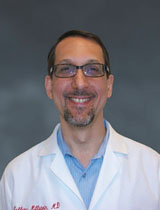Takeaway
The clinically excellent clinician is guided by a commitment to advocate for the health and well-being of all who need care, no matter who they are.

Lifelong Learning in Clinical Excellence | December 3, 2019 | 2 min read
By Jeffrey Millstein, MD, Penn Medicine
You might not expect to hear this from a physician, but one ongoing source of inspiration in my work is a fictional police officer. Harry Bosch, the legendary LA homicide detective from Michael Connelly’s series of novels, has a lot of wisdom to share, and much of it is translatable to medicine.
Hieronymus “Harry” Bosch, named after the 16th century Dutch painter, grew up in orphanages and occasionally with foster families. At age 17, he joined the United States Army and served in Vietnam as a soldier who infiltrated the labyrinthine tunnels used by the Vietcong and North Vietnamese army. After returning from Vietnam, Bosch joined the LAPD, rising to a senior detective rank in the robbery-homicide division. His tough yet compassionate nature along with prodigious investigative talent drive a series of gripping mysteries, which Connelly writes with consistent mastery.
Bosch, besides being a crackerjack detective, is a passionate humanitarian, always intent on doing the right thing even if it goes against the grain of “business as usual” or police culture. “Everybody counts or nobody counts,” is his infamous refrain, meaning he will pursue justice no matter which rung of society the victim sits. In his own way, Bosch combats the implicit bias that we in medicine face in caring for the sick and injured. There are many profound, beneficent principles that drive Bosch’s commitment to his craft, and here are a few that always inspire me in my practice:
“Take every case personally.”
This is a rule followed by Bosch and his mentors, who are driven by their own emotional investment in every case. In the novels, this can sometimes lead to obsession, which is part of the way Connelly hooks the reader. Bosch’s passion and empathy inspire me to advocate for my patients, and to confront my own vulnerability in order to get closer to my patients. Dissolving emotional distance that we learned in medical training can be very rewarding for both patient and doctor, for example by asking about emotional trauma or offering unconstrained presence to a cancer patient.
“You can’t patch a wounded soul with a Band-Aid.”
This line reminds me to always look below the surface with my patients—notice facial expressions, body language, and ask probing questions to get at the real underlying concern. That brings us from patchwork to real healing.
“Less is more, meaning the less time you spend on paperwork, the more time you have to follow the leads of the case.”
Here the detective’s and physician’s worlds are superimposable. Increasing screen time and non-clinical tasks disrupt our focus on rapport building and diagnosis, as well as threaten our well-being. Bosch has yet to find a fix for this in police work, but his quotation inspires me to manage-up our team so we can all focus on top-of-license skills.
“The thing about this is I care.”
This is the Harry Bosch credo in a nutshell. It is a passionate commitment to his work on behalf of people in need and victims of injustice. It is fitting that “care” is the suffix for most everything we do in medicine—healthcare, patient care—it is what ultimately inspires me to show up at the office, navigate obstacles, and stay engaged.

